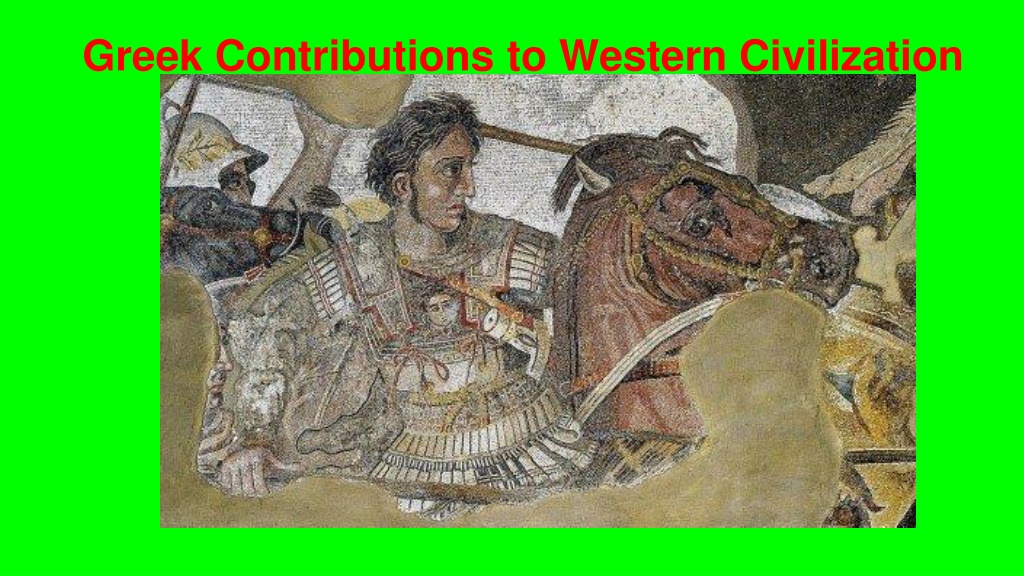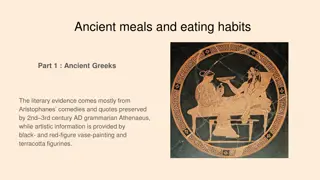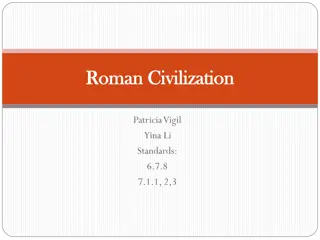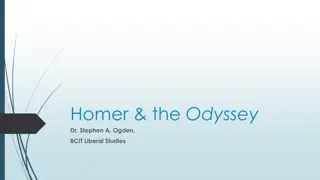Greek Contributions to Western Civilization
Explore the notable contributions of ancient Greece to Western civilization, including the establishment of democracy, development of the alphabet, creation of the first computer, and the origin of the Olympic Games. From democracy and language to technology and sports, the impact of Greek culture resonates in modern society.
Download Presentation

Please find below an Image/Link to download the presentation.
The content on the website is provided AS IS for your information and personal use only. It may not be sold, licensed, or shared on other websites without obtaining consent from the author. Download presentation by click this link. If you encounter any issues during the download, it is possible that the publisher has removed the file from their server.
E N D
Presentation Transcript
1. Democracy Democracy is a government ruled by the people . The ancient Greeks created the world s first democracy. Athens started out with a monarchy and then advanced to an oligarchy until it finally reached a democracy. The democratic government consisted of 6,000 assembly members, all of whom were adult male citizens. The assembly voted on issues throughout Athens. In order for a law to pass, the number of votes needed to be a majority. But in order to banish or exile someone, all 6,000 votes were needed. Today, at least in the United States, we use a democratic system. But instead of a direct democracy, we have a representative democracy in which the citizens democratically vote on who should make the decisions in the country. This is different than ancient Greece's direct democracy wherein citizens voted on the decision rather than choosing people to make the decision.
2. The Alphabet Derived from the earlier Phoenician alphabet, the greek alphabet was the first alphabet in the western sense of the word, featuring distinct letters for vowels and consonants. It was developed after the Dark Ages and consisted of 24 letters, ordered from alpha to omega. Believe it or not, the word "alphabet" originates from the first 2 letters of the Greek alphabet: alpha and beta. Today many letters of our modern alphabet originate from the Greek alphabet, including letters such as A, B, E, and O. The Greek originally had a single form of each letter, but created upper case and lower case versions of the letters later.
3. The Computer Forget all you know about Apple, Bill Gates and Microsoft, the very first computer, an analogue computer, was found by sponge divers concealed in the wreckage of a ship, off the shore of the Greek island of Antikythera in 1901. Said to date back to around 87BC, the Antikythera mechanism, as it s known, was encased in a wooden box, and consisted of a clockwork mechanism of about thirty bronze gears and was used to calculate astronomical positions and eclipses, for use in calendars, and other astrological goings on. The Antikythera Mechanism is now kept at the National Archaeological Museum in Athens, Greece.
4. The Olympics The Olympic Games started in ancient Greece, specifically in the city of Olympia. The participants were the city-states of Ancient Greece and its colonies. The Olympic Games were held every four years in honor of Zeus, the king god. The prizes for winning were fame and glory. Statues of the winners were erected and sometimes the winners' faces were even put on coins. Today we still celebrate the Olympic Games and continue some of the old traditions, such as the olive leaf crowns, the lighting of the flame, and the opening and closing celebrations. Greece also held other games such as the Ptythian Games, which were held in honor of Apollo, the sun god, and the Isthmian Games, which were held in honor of Poseidon, the sea god. It was the beginning of the first sporting events.
4. The Olympics Continued The first games put on by the IOC were held in Athens during the summer of 1896. The 1896 Summer Olympics brought together 14 nations and 241 athletes who competed in 43 events. What Is the Meaning of the Olympic Rings? The symbol of the rings, which are interlocked and colored yellow, black, green and red with a white background, were designed by Baron Pierre de Coubertin in 1912. The colors of the rings along with the white background were intended to represent the five participating continents: Africa, Asia, America, Oceania and Europe. They also composed the colors of the flags of all the participating countries at the time. Upon releasing the design, Coubertin said: "The six colors [including the flag's white background] combined in this way reproduce the colors of every country without exception. The blue and yellow of Sweden, the blue and white of Greece, the tricolor flags of France, England, the United States, Germany, Belgium, Italy and Hungary, and the yellow and red of Spain are included, as are the innovative flags of Brazil and Australia, and those of ancient Japan and modern China. This, truly, is an international emblem."
5. Science and Mathematics Along with being the birthplace of many great mathematicians, Greece was also the mother country of many famous scientists. What Greek Thinkers Influenced Science and Mathematics? Eratosthenes This mathematician was the first to calculate the circumference of the Earth. He did this by comparing the altitudes of the mid-day sun at two different locations. Eratosthenes also calculated the tilt of the Earth's axis, and eventually became the chief librarian of the Library of Alexandria. Aristarchus This astronomer and mathematician was the first to create a model with a sun at the center of the known universe with the Earth revolving around it. He also placed the planets of the solar system around the sun in the right order, and thought stars to be other bodies like the sun. Nicolaus Copernicus attributed the heliocentric theory to Aristarchus.
5. Science and Mathematics Continued Archimedes Archimedes is generally considered the greatest mathematician of antiquity and of all time. He anticipated modern calculus, geometrical theorems, and learned to calculate the area geometric shapes, including the circle and sphere. Some of Archimedes other achievements include coming up with an accurate approximation of pi and designing effective levers and pulleys. One of his famous quotes was, "Give me a lever long enough and I will move the Earth!" Hipparchus Hipparchus is generally known as the greatest astronomer of antiquity. He developed the first models depicting the movement of the sun and the moon, and may have been the first to predict solar eclipses.
6. Architecture One of the most common examples of Greek architecture in the modern world is the column or pillar. The most famous example of Greek architecture is the Parthenon, a grand building with pillars located in Athens. Today, pillars are used in many public buildings such as churches and libraries. There are also pillars in many buildings in Washington D.C., including the White House. What Inspired Greek Architecture? The ancient Greeks being an extremely religious people, many of the architectural structures erected in Greece were designed with the gods in mind. The Parthenon and the Erechtheum are two examples of great and thoroughly Greek structures. Some characteristics of Greek design are precision, adornment, largess and synergy. Each aspect and characteristic of Greek architecture was designed to compliment and relate to one another. Because each Greek structure was inspired by the story and unique abilities of a specific god, there is irony in the fact that most buildings that mimic Greek style in the modern world are government centers.
7. Mythology Many of us still read Greek myths today. Others read Greek myths without knowing it, the godly characters being replaced by humans. Some of the most famous myths include the tales of Peruses, Theseus, and, of course, Heracles. The Greeks often used these myths to explain things that science couldn't prove, but today, we mostly enjoy the Greek myths for entertainment purposes. Greek mythology has pervaded nearly every form of popular culture imaginable. Many Greek myths have been adapted into modern novels, movies, TV shows, video games and even brands. Some well-known instances of Greek mythology in pop culture are: Disney s Hercules The bestselling novel Percy Jackson and the Olympians The God of War video game franchise The TV show Battlestar Galactica Mary Shelley's Gothic novel Frankenstein; or, The Modern Prometheus * The use of the term "Achilles' heel" to describe a weak spot The brand Nike (Nike was the Greek goddess of victory)
8. Standardized Medicine While medicine had been practiced in Babylon, China, India and Egypt, the Greeks were the first to create a standardized system of medicine including medical diagnosis, prognosis, and medical ethics. The manner in which the medical practice is carried out today, in terms of diagnosis and sometimes of treatment, is very similar to that of the ancient Greeks. These ancient advancements in medicine were largely instituted by Hippocrates, who is often called the "father of medicine."
8. Standardized Medicine Continued What Did Hippocrates Invent? Aside from theories and ethics about how physicians should practice medicine, Hippocrates also made direct contributions to the application of medicine. He taught that all ailments had natural causes in a time when people believed that illnesses were punishments from the gods. Some of Hippocrates' contributions include: Hippocratic Oath A Hippocratic Oath is a historical sworn statement by physicians in which they swear by the names of a number of healing gods to uphold specific ethical standards. These include principles such as medical confidentiality and non-maleficence. Below is a excerpt from the full text of the Hippocratic Oath, which remains a rite of passage for some medical graduates. "I will use treatment to help the sick according to my ability and judgment, but never with a view to injury and wrong-doing. Neither will I administer a poison to anybody when asked to do so, nor will I suggest such a course. Similarly I will not give to a woman a pessary to cause abortion. But I will keep pure and holy both my life and my art. I will not use the knife, not even, verily, on sufferers from stone, but I will give place to such as are craftsmen therein."
8. Standardized Medicine Continued Diagnosis of Medical Conditions Hippocrates was the first medical practitioner to categorize illnesses as acute, chronic, endemic, and epidemic. He was also the first to introduce terms such as exacerbation, relapse, resolution, crisis, paroxysm, peak and convalescence. Treatment When it came to broken bones, hemorrhoids or other ailments, Hippocrates and his followers came up with advanced treatments that would reduce pain and speed up recovery. He employed the use of cautery and excision to treat hemorrhoids, and in some cases these methods are still used today.
9. Trial by Jury The democratic people of ancient Greece, specifically Athens, were the first to employ trial by jury as we know it today. Jurors were required to be male citizens of Athens, and a mechanism by the name of dikasta ensured that no person could select jurors for their own trial. Normal cases would summon a jury of up to 500 jurors. For more serious cases, like those involving death, up to 1,501 jurors could be summoned. With so many jurors, the unanimity rule employed in today's courts could not work, so the verdicts of the courts of ancient Athens were reached by majority. Jurors were compensated one day's wages for sitting in court.
9. Trial by Jury Continued How Does Trial by Jury Work? A trial by jury today works much the same as it did in the time of ancient Greece. After hearing the final arguments of the defendant or their legal representative, the jury which consists of 12 citizens in the United States leaves the courtroom and enters deliberation. In most states the jury begins by electing a foreperson or presiding juror. The presiding juror facilitates the discussion and often delivers the verdict. The bailiff serves as the intermediary between the judge and the jury, and also ensures that no one communicates with the jury during deliberation. In nearly all cases, the jury must come to a unanimous decision of either guilty or not guilty. If the jury cannot come to a unanimous decision by the end of the day, the jurors may be sequestered, which is to be given room and board and cutoff from any outside influence such as other people, television or newspapers. However, most of the time, the court will allow jurors to return to their homes at night before returning the next day to resume deliberation. If the jurors cannot agree on a verdict in a reasonable amount of time the result is called a hung jury, which leads to a mistrial. In the event of a mistrial, the case is not decided and must be tried again at a later date and before a new jury.
10. The Theater If you've ever gone to a concert, play or movie, you've benefited from one of the ancient Greeks' most obvious contributions to the modern world: the theater. The word "theater" is derived from the Greek word "theatron," meaning the seating section of outdoor arenas where people watched plays. The first western theater originated in Athens, and was, like many other ancient Greek theaters, a semi-circular structure cut into a hillside that was capable of seating 10,000 to 20,000 people. The standard Greek theater consisted of three parts: a dancing floor, dressing room and scene-building area. The acoustics of the theater were one of its most important features, allowing the words of the exclusively male actors to be heard by everyone within. The ancient Greeks loved plays and each town had its own performing company which would compete against that of neighboring towns.
10. The Theater Continued When Did "Theater" Begin? Beside creating the physical structure of a theater, the ancient Greeks also created "theater," the art form which employs actors, stage setting and sometimes music to create a story usually a comedy, tragedy or satyr play in the 6th century BCE. The first playwrights (as we use the word today) originated in Greece with men like Aeschylus, Sophocles, and Euripides. These men deserve the credit for theater as we know it, and have had no small impact on the methods by which storytellers throughout the ages have chosen to deliver their narratives.
Now that you have read through the Achievements of Ancient Greece, I want you to rank the achievements 1-10. After you have ranked the achievements 1-10, I want you take the top three and make a Claim and Justify why you ranked them in the order you did. When everybody in your group has ranked their top 3, then as a group I want you to come up with a top three as a group. Be ready to have a little mini debate over your results.























